Subscriber Benefit
As a subscriber you can listen to articles at work, in the car, or while you work out. Subscribe Now

This year could be described as a historic one for Indiana. The state’s ban on gay marriage was overturned by the courts, and, for the first time, a woman was chosen as chief justice of the Indiana Supreme Court. In fact, women are leading most of the courts in Indiana. In 2014, we saw changes in the law schools, a new criminal code implemented, and attorneys in trouble with the court and the law. (Remember the attorney who doesn’t like to wear socks?)
Same-sex marriage becomes legal in state
On June 25, Chief Judge Richard Young in the U.S. District Court for the Southern District of Indiana found the state’s ban on same-sex marriage unconstitutional, sending a rush of couples to clerk’s offices around the state to apply for marriage licenses and get married.
But the euphoria gays and lesbians felt quickly subsided. Some county clerks refused to issue licenses, and the 7th Circuit Court of Appeals imposed a stay June 27 preventing gay marriage until it ruled on the matter. In September, the federal appeals court agreed with Young and affirmed the law is unconstitutional.
 Young
Young“The challenged laws discriminate against a minority defined by an immutable characteristic, and the only rationale that the states put forth with any conviction – that same-sex couples and their children don’t need marriage because same-sex couples can’t produce children, intended or unintended – is so full of holes that it cannot be taken seriously,” Judge Richard Posner wrote for the Circuit Court.
 Posner
PosnerBut again, same-sex couples had to wait until the Supreme Court of the United States weighed in on the matter after the 7th Circuit issued another stay.
When the U.S. justices declined to take the same-sex marriage cases before them on Oct. 6, it meant that gay marriage became legal again in Indiana and several other states.
Rush to the top
Loretta Rush, the state’s second female justice, was selected Aug. 6 to replace Justice Brent Dickson as chief justice of the Indiana Supreme Court. She is the first woman to serve in the position. Her ascent to the top of the state courts came less than two years after she joined the high court.
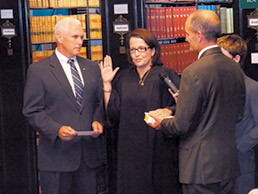 Loretta Rush takes the oath of office as chief justice of the Indiana Supreme Court Aug. 18 from Gov. Mike Pence, left, alongside her husband, Jim, and youngest son, Luke. (IL file photo)
Loretta Rush takes the oath of office as chief justice of the Indiana Supreme Court Aug. 18 from Gov. Mike Pence, left, alongside her husband, Jim, and youngest son, Luke. (IL file photo)Her interview by the Judicial Nominating Commission caught some people’s attention when commission member John Ulmer asked Rush about maintaining a home-life balance when raising young children – a question that wasn’t asked of the male justices. Rush answered that throughout her career she has became a really good time manager and her family provides help because they believe in the mission of what the courts do.
Her selection was praised by many, including Gov. Mike Pence, Indiana Attorney General Greg Zoeller and lawyers from her hometown of Lafayette.
William Emerick, an attorney at Stuart & Branigin LLP in Lafayette, has known Rush more than 25 years. “We knew she had the background, training, experience and good judgment to fill the shoes of Chief Justice Dickson,” he said.
“She was always a great advocate for her clients and was always very easy to work with” as an attorney, he said, recalling cases he tried against her. As a judge, Emerick believes Rush’s sincere interest in solving problems is clear.
“I think it’s her genuineness that truly comes across. She’s just a real person,” he said.
Unlike Dickson’s selection as chief justice in 2012 when Randall T. Shepard retired, the four remaining justices interviewed by the commission did not unite behind one person for the position. Dickson told Indiana Lawyer in July that he believed consensus among the justices on who should be the next chief justice was unlikely. Justices Rush, Steven David, Mark Massa and Robert Rucker each told the commission members what he or she would do if chief justice.
Rush took her oath as chief justice Aug. 18 in the Indiana Supreme Court Law Library.
Overhaul of criminal code takes effect
A landmark event occurred July 1 when Indiana began implementing its new criminal code, the first major overhaul of the massive statute in more than 35 years. Prosecutors, public defenders and judges around the state attended special seminars, updated computer programs and read through the new criminal code in preparation for the switch. Many said they will need about six months before they feel comfortable with the new code, and they expect they will be juggling cases charged under the old code for at least another 12 to 18 months.
Under the new code, felonies are no longer classified by letters, but by levels 1-6. Sentences and credit time have also changed for some crimes. Generally, the new criminal code divides offenses so individuals convicted of drug and nonviolent crimes will get one day credit for every day served, while persons guilty of violent crimes will get one day credit for every three days served. Consequently, defendants convicted of serious offenses, like murder and rape, will have to serve at least 75 percent of their sentences.
In general, penalties for drug offenses were reduced with placement made in a community-based treatment program rather than incarceration in the Department of Correction.
Indiana’s new criminal code is the result of several years of work in the Legislature. The intent is to put proportionality back into the statutes by making sure the penalties are appropriate for the crimes as well as to ease overcrowding in the state prisons by incarcerating only violent offenders while providing alternative sentences to the nonviolent defendants.
The General Assembly passed the overhaul during the 2013 session but delayed the effective date until July 1, 2014. Work continued on House Enrolled Act 1006 and, in the 2014 legislative session, lawmakers revamped the sentencing structure to try to give judges more discretion and to ensure the Indiana Department of Correction would not run out of space.
Indy mayor proposes new criminal justice complex
 A rendering of the criminal justice center by winning bidder WMB Heartland Justice Partners. (IL file photo)
A rendering of the criminal justice center by winning bidder WMB Heartland Justice Partners. (IL file photo)In December 2013, Indianapolis Mayor Greg Ballard and city and court officials announced a plan to build a $500 million criminal justice complex in Marion County to house the courts, jails and other offices in one location. Currently, those entities are spread across downtown Indianapolis and the county. The announcement has caused some controversy regarding selection of its location, how it will be financed, and transparency of the details.
Most agree it would be ideal to have all of the court-related functions in one location, but few could agree where the future criminal justice complex should be located. The city originally preferred a site near the Indianapolis International Airport on the edge of the Hendricks County and Marion County line, but later decided on a location on the former GM stamping plant just west of the heart of downtown.
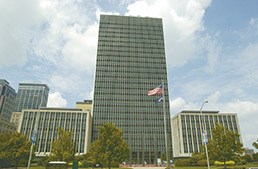 The justice center would move criminal courts from the City-County Building. (IL file photo)
The justice center would move criminal courts from the City-County Building. (IL file photo)Creating a justice center outside of the city’s center raised concerns about accessibility by the public, the extra time to travel to court by attorneys, and the impact on businesses and real estate if the court-related functions left. At this point, civil court would remain in its current location in downtown Indianapolis, but Indianapolis Director of Enterprise Development David Rosenberg said civil courts could be relocated to the new criminal complex in the future.
The mayor selected three bidders and released the request for proposals in April. The city did not make most of the RFP public until October. The mayor’s office announced Paris-based WMB Heartland Justice Partners as the winning bidder Dec. 12, and it will pay WMB Heartland $1.6 billion over 35 years for the new justice center.
City officials have repeatedly said that taxes will not be increased to pay for the construction and that efficiencies created by consolidating criminal courts and services in one location will fund the complex.
2 law schools welcome new deans while a third experiences abrupt departure
 Parrish
ParrishIndiana’s law schools saw new leadership this year when Austen Parrish joined Indiana University Maurer School of Law in January and Andrea Lyon joined Valparaiso University Law School in July. Parrish came to Bloomington from Southwestern Law School in Los Angeles, where he served as the school’s interim dean for 16 months.
John Applegate, IU executive vice president for University Academic Affairs and chair of the dean search committee, said Parrish will fit in well at IU Maurer.
 Lyon
Lyon“He is enthusiastic about looking change in the face and figuring out a way that we can still provide a superb education in a new environment,” Applegate said. In his first year on the job, Parrish has created partnerships with several schools – both in Indiana and out-of-state – to encourage students to attend IU Maurer for their legal education.
Just a month into her tenure as dean at Valparaiso Law, Lyon told alumni in Indianapolis about her nontraditional plan to improve the institution’s national ranking in US News & World Report. She wants to emphasize the school’s focus on training people to be lawyers and wants to get a national reputation for its clinical programs and legal writing courses that give students hands-on experience.
 Alexander
AlexanderValparaiso Law is annually classified in the “rank not published” category of the magazine, a designation given to schools that have a ranking below US News’ cutoff point of roughly 150.
And sandwiched in between Parrish’s and Lyon’s first days on the job was the sudden departure of Indiana Tech Law School Dean Peter Alexander in May. Indiana Tech announced May 23 without any explanation that Alexander – the school’s first and only dean – stepped down days earlier. Alexander said in a statement that he had achieved the goals he established for the institution and has a desire to pursue other employment opportunities. At the time, the school said Alexander would remain with the school in a consulting role but did not detail what his duties would be going forward.
Alexander came to Fort Wayne in January 2012 from Southern Illinois University School of Law to help launch Indiana Tech’s law school, which opened to its first class in the fall of 2013. Associate Dean for Academic Affairs andre douglas pond cummings was named interim dean.
“While Peter is and was a dynamic and charismatic leader, the vision is completely shared by me and the folks we hired,” cummings said shortly after Alexander’s departure. “I think we’re totally and completely on track as far as what we set to do in the very beginning.”
 cummings
cummingsAt the time Alexander left, Indiana Tech was in the process of seeking provisional accreditation from the American Bar Association. An ABA site team visited the school in September and submitted its report to the bar association’s Section of Legal Education and Admissions to the Bar’s accreditation committee, which will decide whether the school qualifies for provisional approval. Without approval, Indiana Tech graduates would not be eligible to sit for most states’ bar exams.
The school announced in late November that Charles Cercone, currently dean of faculty at Western Michigan’s Thomas M. Cooley Law School, has been selected as Indiana Tech’s new dean. He begins at the school Jan. 5, 2015.
Bad barristers pay price for legal misdeeds
Stop us if you’ve heard this one before: an Indiana attorney accused of stealing potentially millions from his clients is criminally charged and resigns from the bar. No, it’s not William Conour (more on him in a minute); 2014’s version is Valparaiso attorney Clark W. Holesinger. Holesinger was charged in February in Porter County with four counts of Class C felony theft of property valued at $100,000 or more and one count of Class D felony theft.
 Conour
ConourHolesinger is accused of stealing $817,962 from North Star Stone Inc.; $233,410 from RBF Island Investment LLC; $215,406 from ITF LLC; and $371,736 from Maridor LLC, with the earliest alleged thefts taking place in February 2011. All of the companies are located in Valparaiso and owned by Chris Andrews, according to the probable cause affidavit, which says Holesinger also had been Andrews’ family attorney since the mid-1990s.
Those companies filed separate civil tort and malpractice suits against Holesinger, and the parties reached an agreement on the matters, which was not disclosed. Porter Superior Judge William Alexa in February found Holesinger in direct contempt for failing to appear at a January hearing on the plaintiffs’ petition for accounting.
In March, Holesinger tendered his resignation from the bar. His criminal case was scheduled to go to trial Dec. 1, but was reset for April 2015.
Around the time Holesinger resigned from the bench, another Indiana attorney who made headlines for her actions as a judge was removed from her judicial post by the Indiana Supreme Court. On March 4, the justices disciplined Marion Superior Judge Kimberly Brown after finding she engaged in significant judicial misconduct. Brown had been on paid suspension since Jan. 9 pending final discipline.
 Brown
BrownA panel of special masters found that the Judicial Qualifications Commission proved more than 80 rule violations by Brown on 46 of 47 charges. She was accused of wrongful detention of at least nine criminal defendants, failing to properly oversee her court, improperly supervising trials, failing to act on Court of Appeals orders, showing hostility toward parties who came before her, and retaliating against court staff who complained.
Justice Robert Rucker proposed a 60-day suspension without pay followed by removal from office stayed for one year of supervised probation by the Division of State Court Administration.
Brown is not barred from practicing law but the discipline does render her ineligible for judicial office.
Former treasurer for the Marion County Bar Association Trezanay Atkins lost her law license for at least two years after the justices suspended her Sept. 22. Atkins admitted to converting the proceeds of more than 50 checks drawn on the association’s bank account totaling more than $9,100 while she served as treasurer from June 2011 to December 2012. She told the Indiana Lawyer in June that she was resigned to the likelihood she would lose her license as a result of her actions, which she said she took because she was in personal financial distress.
Atkins made restitution to the MCBA, but the court did not find that to be a mitigating factor.
Atkins shut down her law practice prior to the discipline and launched a public relations company.
 Atkins
AtkinsThis year, the government decided it would not seek a longer prison sentence for ex-attorney William Conour, who was convicted in 2013 of one count of wire fraud stemming from claims he stole nearly $7 million from clients’ trust funds over the years. He was sentenced to 10 years in prison in October 2013.
Conour appealed his sentence in December, arguing the court failed to investigate his defense counsel’s motions to withdraw during the restitution proceedings after Conour had been sentenced. Various public defenders had appeared for Conour at the time the U.S. District Court for the Southern District of Indiana became aware the agency was holding $2,512 from a Conour trust fund while he also was subject to the court’s restitution order. Chief Judge Richard Young ordered that money turned over to the court in July.
Conour also claimed he is subject to “suspicionless” searches as a part of his supervised release, and that special terms of his release are overly broad, such as a provision that he must regularly work and support his dependents when he is released from prison. He will have no dependents at that time. The government’s reply brief is due Jan. 2, 2015.
Unusual punishment: Watch what you say, and wear socks
A Crown Point attorney’s discipline in April made headlines, with some fearful the ruling would have a chilling effect on lawyers everywhere. Tim Kelly received a private reprimand for testimonials that appeared on the Law Tigers website, over which he had no content control.
“The grievances that formed the basis for the disciplinary action came from my competitors,” Kelly said. “The primary purpose of the commission is to protect the public, and the public wasn’t complaining.”
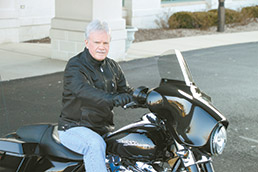 Crown Point attorney Tim Kelly’s disciplinary case made headlines after he received a private reprimand from the Supreme Court. (IL file photo)
Crown Point attorney Tim Kelly’s disciplinary case made headlines after he received a private reprimand from the Supreme Court. (IL file photo)Kelly’s rule violation arose from testimonials on the Law Tigers site that provided examples of previous results. Offending statements included: “Law Tigers changed my life in a big way and my family received our fair share of justice,” and “Law Tigers went above and beyond! The settlement was more than expected!” None of the statements were attributed to Kelly or his firm, and his firm’s site contained a disclaimer that comported with Rules of Professional Conduct.
Law Tigers is a network of the American Association of Motorcycle Injury Lawyers which Kelly subscribed to as a lead-generating service.
Indiana Disciplinary Commission staff attorney Frederick Rice said the judicial opinion makes clear that lawyers should consider themselves responsible for any affiliated Internet communication that appears to benefit them, even if they didn’t publish it themselves.
Kelly’s attorney, Karl Mulvaney with Bingham Greenebaum Doll LLP, argued that the commission was using Kelly’s case as a test case, which is “a due process violation because the Rules of Professional Conduct certainly do not make it clear that participation in (Law Tigers’) group advertising is a violation” of the Rules of Professional Conduct.
This reprimand is the only blemish on Kelly’s otherwise clean record dating to 1972.
A Marion attorney made headlines this summer after he was admonished by a judge for not wearing socks in court. Todd Glickfield’s response to Blackford Circuit Judge Dean Young’s question as to why he wasn’t wearing socks in the courtroom – he “hates socks” – didn’t sit well with Young. Young issued an order that Glickfield show up to court dressed appropriately – which includes socks – or else he may find himself in trouble. This order provided a lot of fodder for blogs and news outlets, with one Chicago law professor referring to Glickford as the “Matthew McConaughey” of the Indiana bar. The Marion Chronicle-Tribune reported in October that a sock company donated several pairs of socks to Glickfield.
 Ogden
Ogden
And in another strange case from 2014, Indianapolis attorney Paul Ogden claimed he was quitting the profession because he did not want to pay a $10,000 fine imposed as a result of his discipline case. Ogden was suspended in June for 30 days with automatic reinstatement after justices found he violated Rule of Professional Conduct 8.2(a) for false statements criticizing Hendricks Superior Judge David Coleman’s handling of an estate case in which Ogden was involved.
That was the lone rule violation the Supreme Court found, determining other comments Ogden made fell under the broad protection of his First Amendment right to free speech.
Ogden posted on his blog, Disbarring the Critics, an analysis asserting that the commission spent more than $20,000 pursuing his disciplinary case, a sum Ogden claims is greater than any other disciplinary matter decided in the past two years.
“It strikes me as being outrageous that we have attorneys in this state who are stealing money from clients, taking money out of their trust accounts and using it for personal use and instead (the Disciplinary Commission) made me the highest priority,” Ogden said.
Justices want Marion County Small Claims Courts in with Superior Court
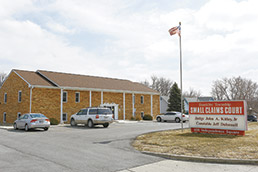 (IL file photo)
(IL file photo)In September, the Indiana Supreme Court recommended abolishing the current system used for Marion County Small Claims Courts and unifying them with the Superior Court’s Civil Division effective Jan. 1, 2016. The system is unique in the state, with the nine townships in Marion County each having a court.
The recommendation comes on the heels of a report from the National Center for State Courts that also recommended moving the small claims courts to Marion Superior Court, as well as a July ruling by the full 7th Circuit Court of Appeals that each township court is a judicial district. Under the Fair Debt Collection Practices Act, that means people can be sued only in the townships where they live or where the transaction took place.
For years, the township courts have been accused of catering to large-volume filers, with allegations of forum shopping by debt-collection filers.
The Indiana Supreme Court amended the small claims rules on Jan. 1, 2014, to require proper venue for collections cases filed in the courts.
The Supreme Court’s recommendation to lawmakers includes a table of 14 statutes that would need to be amended or repealed to abolish the township courts, along with the relevant statutory amendments to establish small claims venues in Marion Superior Court.
The court advocates for an additional eight Marion Superior judges to hear small claims cases. The Marion Superior Executive Committee would determine staffing for the new small claims division.
“After years of studies and deliberation, it is time to implement reforms to ensure that small claims cases in Marion County are treated like small claims cases in other counties,” the court’s recommendation states.
“The changes proposed here seek to achieve an end to the controversies associated with the Marion County township courts; to enhance the quality of fair, impartial, and efficient justice provided in small claims cases, and to strengthen the public’s confidence in Marion County’s management of small claims matters.”
Judge tosses Marion Superior judicial election system
Speaking of Marion Superior Court, the way those judges have been elected since the 1970s may be about to change. In October, a federal judge ruled the Marion Superior judicial election system is unconstitutional.
Marion County is the only Indiana county that uses the unique hybrid method of trial judge selection. The method was instituted following the complete removal of the county’s Republican judges after the Watergate scandal. In Marion County, Republicans and Democrats get the same number of judicial candidate ballot spots. The parties hold slating conventions where they endorse those who will appear on the ballot, and each party collects money from candidates to pay for election costs.
If a candidate wins in the primary, he or she is guaranteed to win in the general election as long as at least one ballot is cast in his or her favor.
Chief Judge Richard Young in the Southern District of Indiana noted in his ruling that this election system appears unique in the country, too. He agreed with plaintiff Common Cause’s argument that I.C. 33-34-19-13(b) is unconstitutional. Because primaries are restricted to the two major parties, only people eligible to vote in primary elections have a chance to cast a meaningful ballot for only half the open judgeships. Furthermore, people ineligible to vote in these elections because they do not declare a party have no say in the election of the judges, Common Cause alleged.
“… [T]he potential for independent and third-party candidates to appear on the ballot does not alleviate the burden imposed by Indiana’s electoral scheme: when a person proceeds to the ballot box on Election Day, he or she must be afforded an opportunity to vote for the judge who will fill Marion Superior Court #1, the judge who will fill Marion Superior Court #2, and so forth,” Young wrote. “Indiana law does not permit this. … The court therefore finds the challenged Statute severely burdens the right to vote.”
Young stayed his ruling during the 30-day period within which the defendants may file a notice of appeal, so it didn’t impact the 2014 general election. The stay will remain in effect until the 7th Circuit rules on the matter. All briefs are due by early February 2015.
Class action alleges civil rights violations by Clark drug court
Forty people who participated in the Clark County Drug Court say they were allowed to languish in jail without a hearing, attorney or other due process. The participants filed a lawsuit, which was certified as a class action in September.
Plaintiffs include Destiny Hoffman, who furnished a diluted drug screen and was sanctioned with a 48-hour stay in the Clark County Jail. But she wasn’t freed for another five months. Jason O’Connor was given a 30-day drug court sanction on June 20, 2013, but he lingered behind bars in Jeffersonville until Jan. 24 – more than 180 days longer. Nathan S. Clifford also was detained months longer than he should have been.
Federal Judge Sarah Evans Barker ruled in October that Clark Circuit Judge Jerome Jacobi, who oversaw the drug court, must remain a defendant in the lawsuit. He sought dismissal based on lack of jurisdiction and for mootness since he no longer presides over the court. After allegations of illegal detentions surfaced, drug court operations were suspended and the program was reinstituted on a probationary basis under Judge Vicki Carmichael.
Jacobi lost his re-election bid in the Democratic primary in May.
Award for HIPAA violation raises liability concerns
A Marion County jury award of $1.4 million upheld by the Indiana Court of Appeals in November was called a “game-changer” for health care providers whose employees handle private medical information, according to one attorney.
Abigail Hinchy was awarded the million-dollar verdict after her ex-boyfriend’s then-girlfriend, who was a Walgreen pharmacist, accessed her drug records and reported the medications she was taking to the ex-boyfriend. The jury found Walgreen liable on claims of respondeat superior, negligent supervision and retention, and invasion of privacy.
The case set a national precedent in finding that a company could be held liable for the acts of an employee who violated federal patient privacy protections in the Health Insurance Portability and Accountability Act.
“I do think it’s a game-changer,” Plews Shadley Racher & Braun attorney Stephanie Eckerle said. “This was a remarkable case because it involved a breach of privacy by one person of one customer’s medical information,” rather than a mass breach of private information.
Hinchy’s attorney, Neal Eggeson, said the case represents a culmination of trial court decisions around the country suggesting that privacy-violation cases using HIPAA as a community standard of care could move forward.
Walgreen argued the case should have been resolved on summary judgment.
“We believe it is a misapplication of the law to hold an employer liable for the actions of one employee who knowingly violates company policy,” the company said.
Indiana University Robert H. McKinney School of Law professor David Orentlicher said an important takeaway from the case is that health care providers need to be aware that they may face liability under state laws for privacy breaches under the federal HIPAA law.
As more private medical records are stored electronically, the decision means that the ready availability of patient data also creates new potential liabilities for those with access to the records, he said.•
E-filing, reporting of pro bono hours starting in 2015
 Indiana Court of Appeals Judge Paul Mathias has a leading role in the state courts’ e-filing initiative. (IL file photo)
Indiana Court of Appeals Judge Paul Mathias has a leading role in the state courts’ e-filing initiative. (IL file photo)The Indiana Supreme Court issued an order in May for state courts to begin the transition to e-filing in 2015. Indiana has some experience with e-filing. Marion and Lake counties, the state’s two most populous, have had pilot projects in place for years since the Supreme Court authorized them in 2006. Those pilots will continue.
“Nearly every aspect of our lives includes electronic documents — stores send receipts via email, banks allow check deposits through a smart phone,” Chief Justice Brent Dickson said after the announcement. “Now lawyers and litigants will be able to file court documents electronically. Using this technology, our courts will be more efficient and better able to administer justice without delay.”
The Division of State Court Administration plans to begin implementing e-filing in phases next year. Court of Appeals Judge Paul Mathias is taking a lead role in the effort and said paper filing likely will be phased out so clerks won’t be burdened with overseeing two filing methods.
The initiative coincides with a planned conversion of appellate courts to the state-supported Odyssey case management system now in use in courts in 48 counties. Robert Rath, director of appellate court technology, said the conversion will allow attorneys and the public to view trial and appellate case dockets on the same site.
In September, the justices approved the requirement for attorneys to report their pro bono hours, beginning Jan. 1, 2015. The requirement has been amended into Rule 6.7 of the Rules of Professional Conduct.
Attorneys will have to report, as part of their annual registration, the number of hours of pro bono service provided. However, their hours will not be publicized. The Supreme Court followed a recommendation made by a special task force formed by the Indiana Pro Bono Commission that the hours worked not be identified publicly or on either an individual or firm basis. Attorneys will also be able to report any financial contributions they have made to a legal service organization or pro bono district.
Any member of the judiciary or judicial staff, government lawyer, or attorney who is retired or of inactive status will be exempted from the reporting requirement.
The Supreme Court is defining pro bono service as free legal services given directly to or for the benefit of individuals whose incomes do not exceed 200 percent of the federal poverty level. Pro bono, according to the court, does not include forgiving a client’s unpaid bill or providing services meant to improve the law, the legal system or the legal profession.
Notable attorneys announce retirements
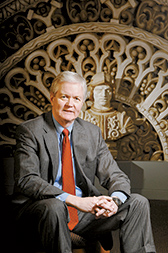 John D. Tinder (IL file photo)
John D. Tinder (IL file photo)Three big names in the Indiana legal community announced in 2014 that they would be retiring, although one judge’s decision got out before he was ready to make it public. 7th Circuit Court of Appeals Judge John D. Tinder will retire in 2015 when he turns 65. That news became public in early March after a clerk applicant shared a letter from Tinder with the legal blog Above the Law, which posted the letter.
In a style colleagues said is typical, Tinder took the episode in good humor. He already had informed federal court administration of his plans, which he said also were known to colleagues on the 7th Circuit.
“It’s not like it was a secret,” Tinder said. “Anybody could look at the calendar and figure out” that he would turn 65 in February 2015. At that point he will be eligible to assume senior judge status, but Tinder said he doesn’t intend to hear cases after more than 25 years on the federal bench.
He joked with Indiana Lawyer that when he retires, he hopes to get a call from the makers of the “Better Call Saul” TV series, which will be a prequel to “Breaking Bad.”
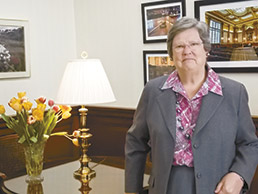 Sarah Evans Barker (IL file photo)
Sarah Evans Barker (IL file photo)“It would be fun to be a judge in a courtroom where Saul Goodman appears,” he said of the crooked lawyer portrayed in “Breaking Bad.”
Also in March, Judge Sarah Evans Barker, Tinder’s former colleague on the U.S. District Court for the Southern District of Indiana bench, announced she would take senior status June 30. Barker, who joined the District Court in 1984, is the first woman to serve as a federal judge in Indiana.
The Southern District of Indiana is one of the busiest District courts in the country and that, Barker said, is one of the primary motivators for her decision to transition at this time – an additional judge will bring relief to the docket. Once she becomes a senior judge, a vacancy will open on the five-member court. When a new judge is appointed, she will cut her caseload to 80 percent. Her reduced caseload, combined with Senior Judge Larry McKinney’s caseload, will essentially add a sixth judge to the Southern District.
“For me, part of the fun has been to come in every day and see what arrives in my inbox and then to see if I am up to the challenges it presents,” Barker said. “I’ll just keep doing it that way.”
 Norman Metzger (IL file photo)
Norman Metzger (IL file photo)Norman Metzger, the longtime leader of Indiana Legal Services, announced in August he will retire March 31, 2015. He has led the legal aid organization since 1970, when it was known as Legal Services Organization of Indianapolis Inc. Under his leadership, the nonprofit expanded beyond Marion County into central and southern Indiana communities like Bloomington, Evansville, Muncie, Richmond and Terre Haute.
Today, ILS is the largest poverty law firm in Indiana, serving clients in all 92 counties.
Metzger’s vision for running a legal services agency, he said, was to “hire the best people you can, do a national search, bring them in here, and then get out of their way because you’d be surprised what bright, young, vigorous, energetic people will do on their own.”
After four decades of getting out of the way, Metzger said this is the right time to retire.
The ILS is looking for more office space to make room for the new attorneys who are coming on board. And with an influx of new federal dollars, ILS has started contracting with private attorneys to provide legal services in rural areas and has created a fellowship program to help the agency develop new services.
“Unless I’m missing something, the time is just about exactly right for me to retire,” Metzger said.•
Please enable JavaScript to view this content.
